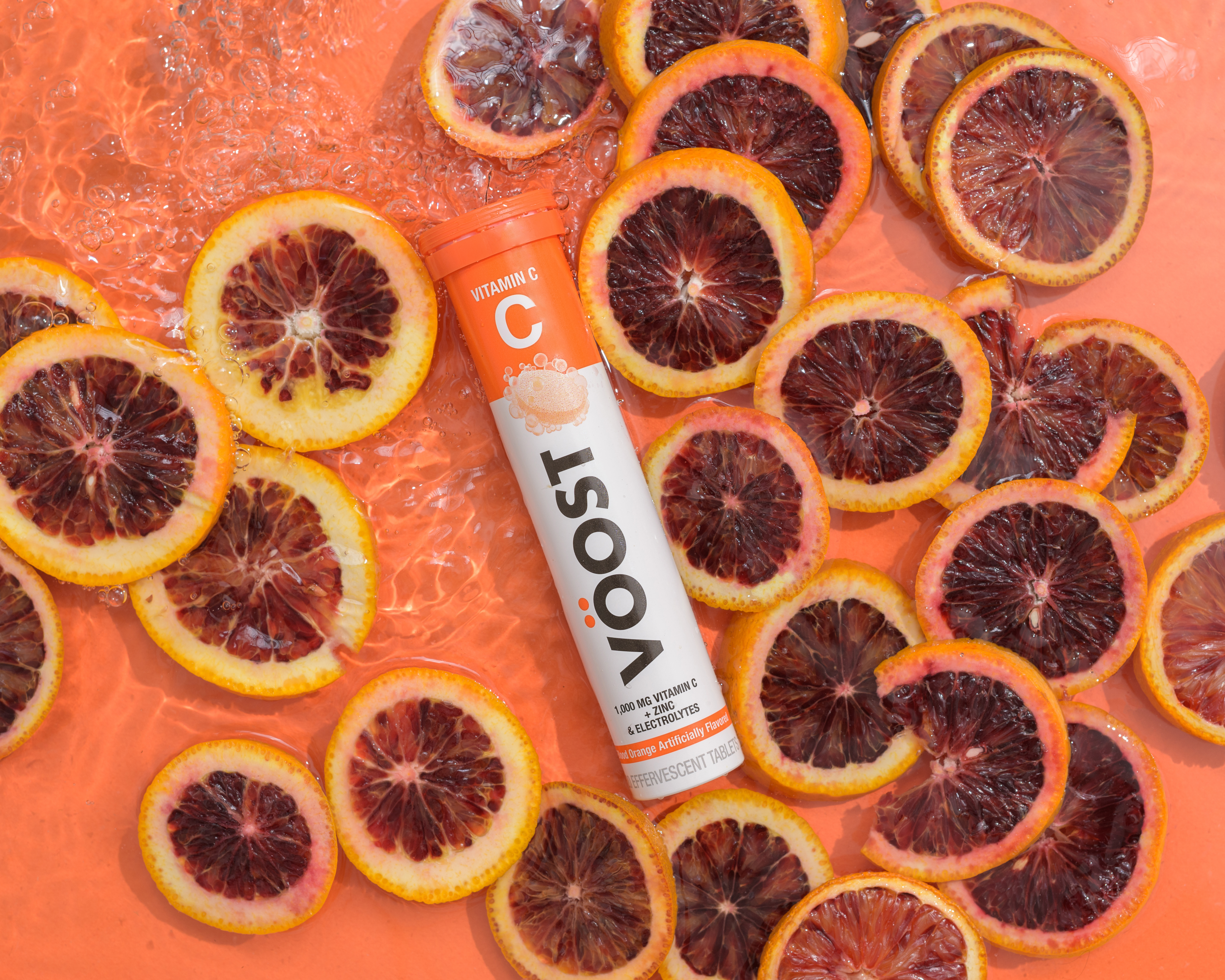The immune system isn’t a single organ—it’s very complex and made up of different cells, tissues, and organs that work together to keep your body healthy and running normally. That’s why it’s so important to give your immune system the TLC it needs. Keep reading to learn about 3 vitamins and minerals that help promote a healthy immune system.
1. Vitamin C
Vitamin C, also referred to as ascorbic acid, is one of the most essential nutrients in the body. It’s required by the immune system to support both the body’s external and internal defense systems. Vitamin C also helps produce interferons, collagen, antibodies, and mucous, which are all essential players in a healthy immune system.¹
Getting enough Vitamin C in your diet every day is important for your immune system. You should be getting at least 90 mg of Vitamin C per day.² VÖOST Vitamin C contains 1,000mg of Vitamin C to support healthy immune function.* With a fruitastic, blood orange flavor, you’ll never want to miss your Vitamin C VÖOST!
2. Zinc
After iron, zinc is the second most common mineral found in the body, and is used in hundreds of metabolic processes, many of which are part of the immune system. One of the most important of these processes creates the hormone thymulin, which is essential for the development of T cells, a critical part of the immune system.³
The daily recommended value for Zinc is 11 mg.² VÖOST Vitamin C effervescent tablets support healthy immune function* and are supercharged with 10 mg of Zinc.*
3. Vitamin D
Vitamin D is important for more than just healthy bones, it’s also needed for a healthy immune system. A major component of the immune system, cells called macrophages, require Vitamin D to grow and develop. Vitamin D also helps the immune system tailor its response by signaling to T and B cells to control their levels of activity, as well as regulating the speed of cytokine production.⁴ ⁵
Vitamin D is produced when our skin is exposed to ultraviolet-B rays from the sun, but we can also get it from foods and supplements. The daily value for Vitamin D is 20 mcg.² VÖOST Vitamin D effervescent tablets have 50 mcg of Vitamin D to support immune health.* When you pair that with its ahh-mazing blackberry peach taste, VÖOST makes it easy to keep up with your Vitamin D needs!
More Tips to Support Your Immune System
Supporting your immune system is more than making sure you get the daily value of vitamins and minerals every day. You should also think about your lifestyle and daily habits, like getting enough sleep and exercise. When it comes to supporting your immune system, there are steps you can take that will help you stay healthy and give you more energy, to keep you on the go.
1. Establish good sleep hygiene habits.⁶
Even though we often treat sleep as an optional part of good health, nothing could be further from the truth. Getting enough rest is important. The immune system also relies on deep, restful sleep for peak performance. Most adults need between 7 and 9 hours of sleep every night.
Falling asleep is a process, not an abrupt transition, and the process typically starts at least an hour before we drift off to sleep. Making sure you’re signaling to your body that it’s time for bed will help keep you from tossing and turning so you can catch your Zzz.
Here’s a few quick tips for maintaining good sleep hygiene:
Set a bedtime—every night.
Yes, even for adults. Our bodies operate on a biological rhythm that works best when we go to bed and wake up at the same time every night and day.
Establish (and observe) a routine for the end of the day.
Having a wind down routine helps cue your internal “clock” to start the process of going to sleep.
Make your bedroom a restful retreat.
When we come to associate being in the bedroom with relaxation, as opposed to sitting in bed while watching our screens, our bodies pick up the cue that it’s time to wind down.
Avoid blue light-emitting devices at least one hour before lights out.
Digital screens like those found in computers and smartphones emit a type of blue light that tells your body to stay awake.⁷
Getting enough sleep is an important part of a healthy lifestyle, so make it a priority, along with taking your favorite VÖOST vitamins.
2. Exercise regularly.
You don’t have to be training for the Olympics to benefit from exercise. It is recommended that adults get 150 minutes of moderate-intensity physical activity and two days of muscle strengthening activity each week.⁸ Even adding a low-intensity exercise like walking can help improve your energy levels, support your immune system, and help you get better sleep.
3. Eat Healthy, Nutrient-Dense foods.
There’s a lot you can do in your daily life to help take care of your immune system and increase your energy. Paying attention to how we eat is one of the biggest changes we can make to get more energy and stay healthy. Be sure to eat a diet of nutrient-dense foods and limit or eliminate your intake of junk foods.
4. Drink plenty of water
Eating healthy and drinking plenty of water go hand in hand. Don’t forget to stay hydrated and listen to cues that your body is giving to tell you that it’s thirsty. A good rule of thumb is drinking eight 8-ounce glasses of water a day.⁹ If you’re tired of plain water, throw in a VÖOST vitamin boost for a fruitastic flavor!
